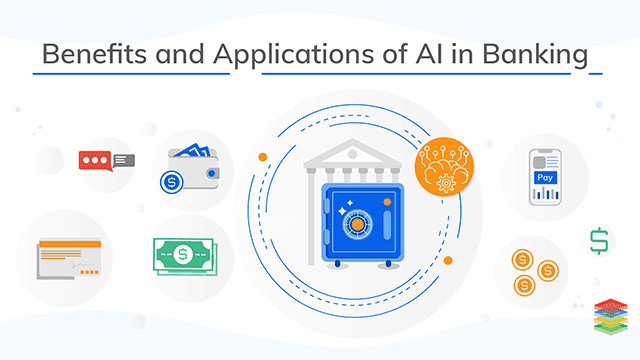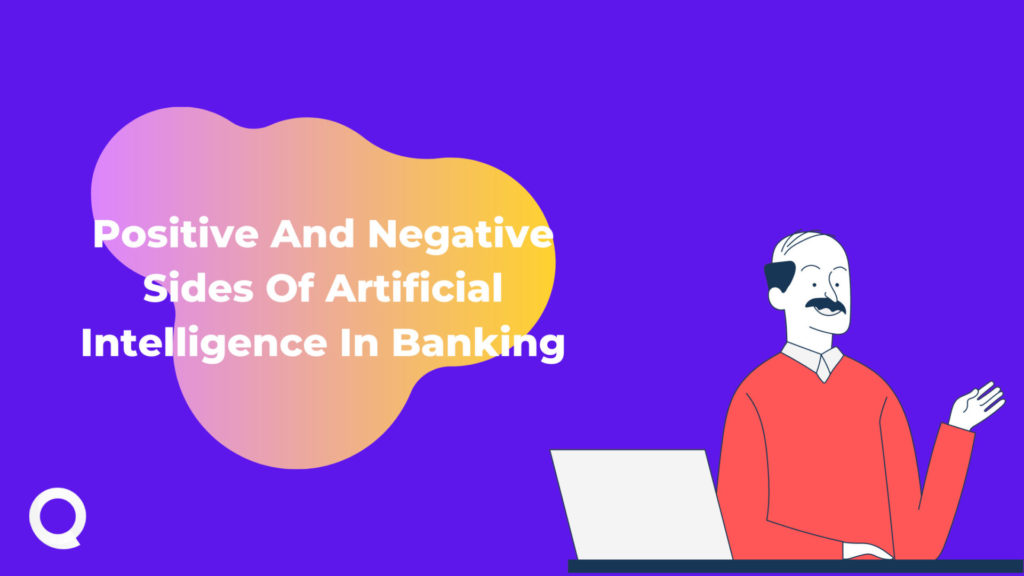The future of the banking industry lies in artificial intelligence, which uses advanced data analytics to stop fraud transactions and increase compliance. An AI algorithm can complete anti-money laundering activities in seconds rather than hours or days, record data in time, allowing them to derive useful information. Artificial intelligence bots, digital payment consultants, and biometric fraud detection mechanisms all improve service quality for a wider group of customers. All of this translates into higher revenues, lower costs and increased profitability.
Advantages of Artificial Intelligence in Banking
Artificial intelligence in banking and finance has a lot to offer today, and the following list highlights some of those benefits, while also addressing some of the risks and barriers that financial services companies face in the implementation of AI.

Lower costs and risk
Despite its large digital dimension, the banking sector involves several manual operations which can take time. Due to the possibility of human error in these transactions, banks bear significant operational costs and risks.
Software that mimics digital, rule-based human-run processes is used in the banking industry to reduce most of the tedious and error-prone tasks associated with entering customer data from contracts, forms, and other sources through robotic process automation (RPA).
RPA robots are becoming intelligent process automation tools capable of handling a growing array of financial tasks traditionally handled by humans when combined with advanced handwriting recognition, natural language processing and other artificial intelligence technologies that merge AI with RPA.
Also Read: Robotic Process Automation (RPA) To Speed Up Banking 7 Usecases To Test Right Now
Better Customer Experience
Banking hours were hated for a reason. Banks were never open when you needed them most, like late at night or during holidays and weekends. In the past, call centres were infamous for keeping customers on hold for long periods of time before hiring an operator, who often wasn’t able to fix the problem. Artificial intelligence in banking (AI) is changing that.
Chatbot on call and its use of conversational assistants is one of the main advantages of artificial intelligence in banking industry. Customers are more comfortable with this software for answering questions and performing many typical banking procedures that previously required person-to-person interaction, as a chatbot is available 24/7.
The use of chatbots to inform their consumers about other services and offers is increasingly common for banks, as well as to answer customer service questions and discuss specific transactions.
Improved Fraud detection & adherence to regulatory compliance
Financial fraud detection machines are far superior to people when it comes to fraud detection. This industry is heavily regulated both in the India and internationally. In order to minimize large-scale insolvencies and ensure that bank customers do not commit financial crimes, governments use their regulators to ensure that banks have appropriate risk profiles. As a result, banks must adhere to a number of regulations that require you to know your customers, protect customer privacy, track transfers, and more.
Improved lending & credit decisioning
Likewise, banks rely on AI-based algorithms to help them make better lending and credit choices that are also safer and more profitable. Many banks still use credit scores, credit history, customer references, and financial transactions to assess whether an individual or business is creditworthy.
It is well known that credit reporting systems are not perfect and that errors, missing real-world transaction histories and misclassification of creditors may lead to heavy financial loss.
Also Read: 7 Lending Risk To Identify For Becoming a Responsible Lender
Investment Automation
To summarize, some banks are entering the field of artificial intelligence by using their intelligent systems to help them make investment decisions and support their research in investment banking. Humans are still involved in making investment decisions, but artificial intelligence (AI) tools are revealing new perspectives through better modelling and exploration.
In addition, many financial services companies offer robotic advisers to assist their clients with portfolio management. Client-specific customization, chatbots, and templates enable these robotic advisers to deliver high-quality investment advice and be available whenever the client needs it.
Disadvantages of Artificial Intelligence
The immaturity of new technology and the short duration of use make it dangerous. As artificial intelligence advances by a rapid rate, its use carries additional risks. Artificial intelligence in banking has many advantages, but there are also risks and obstacles to consider.
AI bias
Inherent AI Bias is one of the most significant dangers of implementing AI in banking as it is the emergence of AI bias. Bias can become exacerbated when the model is used, which can lead to unexpected results.
Clarity & morality
Financial companies are required to provide explanations to potential consumers about their credit choices. For this reason, it is difficult to develop deep learning techniques based on neural networks that find correlations between thousands of variables that are generally incomprehensible to the human brain.
Evolution Cost
The speed at which advances in artificial intelligence (AI) are being made is exhilarating and expensive. Due to the high cost of running algorithms, there is often a delay between when they are developed in the lab and when they are put into practice.
Conclusion
AI will not only allow banks to automate their knowledge workers, but will also make the entire automation process smart enough to eliminate cyber threats and competition. AI is integrated into the bank’s processes and operations, evolves and innovates over time without requiring significant manual intervention. Artificial intelligence will allow banks to make the most of human and mechanical skills to generate operational and economic efficiency and provide good services. All these advantages are no longer a dream for the banks. Leaders in the banking industry have already taken precautionary steps to achieve these benefits by implementing AI.


